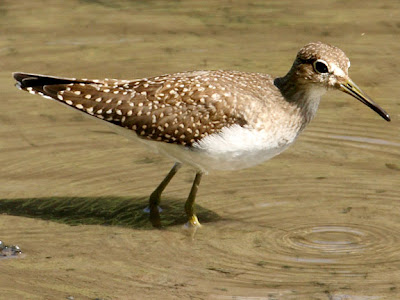Well we got our first real snow of the year yesterday. Fortunately we missed the bulk of the storm, over in South Dakota some places
received several feet of snow from this storm. I expected that when I looked outside this morning that I would find a new white covering but I was happy to see that none of the snow that fell
accumulated. Considering that it was over 70 degrees early last week the ground was apparently still to warm for the snow and it all melted. The temps have below freezing at night now so it probably wont be too long before we are cast into a winter wonderland. One good thing about the cold weather is that perhaps it will encourage the winter birds to head south. I have not seen too many of the birds that winter in the area yet probably because of the
unseasonably warm temps that we had last weekend. If we continue to see these cold temps then the lakes and rivers will begin to freeze and the eagles will begin to congregate in the places where the river remains open during the winter.

One of the rivers that does not remain open during the winter is the
Vermillion River. During the winter it is pretty quiet but back on August 17th I did a bit of birding down at the
Vermillion River. The eastern phoebe, pictured above, is one of the most common types of flycatchers that we see in Minnesota during the summer.

A bird that is much less common is the indigo bunting. Indigo buntings spend the summer on breeding territories mostly on the eastern half on the US. During this time the males are in their breeding plumage, blue and black, and are easy to spot.

In winter they molt into plumage that is much more like that of the female, pictured above. They migrate south at night using the stars to guide them to their wintering grounds down in south Florida, Mexico and Central America.

In the river I found a lone solitary sandpiper. Although they can be seen alone solitary sandpipers are not really solitary. They got their name because of the fact that they do not migrate in large flocks like most other shorebirds do.
 One of the rivers that does not remain open during the winter is the Vermillion River. During the winter it is pretty quiet but back on August 17th I did a bit of birding down at the Vermillion River. The eastern phoebe, pictured above, is one of the most common types of flycatchers that we see in Minnesota during the summer.
One of the rivers that does not remain open during the winter is the Vermillion River. During the winter it is pretty quiet but back on August 17th I did a bit of birding down at the Vermillion River. The eastern phoebe, pictured above, is one of the most common types of flycatchers that we see in Minnesota during the summer. A bird that is much less common is the indigo bunting. Indigo buntings spend the summer on breeding territories mostly on the eastern half on the US. During this time the males are in their breeding plumage, blue and black, and are easy to spot.
A bird that is much less common is the indigo bunting. Indigo buntings spend the summer on breeding territories mostly on the eastern half on the US. During this time the males are in their breeding plumage, blue and black, and are easy to spot. In winter they molt into plumage that is much more like that of the female, pictured above. They migrate south at night using the stars to guide them to their wintering grounds down in south Florida, Mexico and Central America.
In winter they molt into plumage that is much more like that of the female, pictured above. They migrate south at night using the stars to guide them to their wintering grounds down in south Florida, Mexico and Central America. In the river I found a lone solitary sandpiper. Although they can be seen alone solitary sandpipers are not really solitary. They got their name because of the fact that they do not migrate in large flocks like most other shorebirds do.
In the river I found a lone solitary sandpiper. Although they can be seen alone solitary sandpipers are not really solitary. They got their name because of the fact that they do not migrate in large flocks like most other shorebirds do.

No comments:
Post a Comment